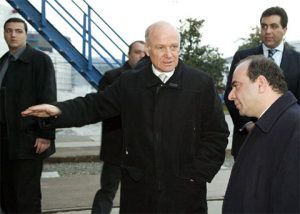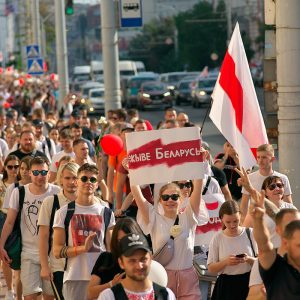The best ever opportunity for Putin to intervene in Belarus?

On 18 August, president Alyaksandr Lukashenka convened his National Security Council with a focus on “external intervention” in the current protests in Belarus. He cited military threats on the “Western borders”, although a couple of weeks ago he had blamed Russia. This shift in rhetoric coincides with the conditions set forth by Putin for providing military help to Lukashenka. The Russian ruler had promised to intervene “for external military threats.“
Meanwhile, on the evening of the same day, a Tu-214VPU aircraft, known to be used by the director of the Russian FSB security service, landed in Minsk. Belarusian opposition media, such as TUT.by, have tended to dismiss the importance of recent military activities in adjoining areas of Russia. Meanwhile, the situation appears extremely unpredictable. Excluding the possibility of an intervention by Putin as “irrational” may be more wishful thinking than the result of sound analysis.
Not taken seriously
Last weekend Lukashenka received pledges from Putin of security support if requested. Russian mainstream media, including Kommersant Daily, published information that on Monday trucks carrying Russian troops, most probably of Rosgvardiya (former internal troops), had been noticed travelling on the roads towards Belarus near Smolensk and Pskov. However so far, most opposition activists, politicians and commentators have dismissed the possibility of the Kremlin sending troops into Belarus. TUT.by commented that instead of moving the infantry on trucks, Moscow would have sent helicopters with special forces as it did in Crimea in 2014. Moreover, TUT.by journalists have emphasised that these trucks have not been observed entering Belarus.
Both arguments are flawed. Firstly, Lukashenka does not need more special forces: he has enough of his own. According to his own admission on Tuesday, he has thus far used only “some of them” to quell the protests. They are not suitable for the problems he is experiencing. What he needs are troops capable of policing or controlling crowds, such as Rosgvardiya in Russia or a private security contractor. Secondly, the troops observed in Russia, could have been deployed close to the Belarusian border both so that they could be prepared to intervene quickly and to demonstrate Moscow’s readiness to intervene. Moreover, these actions may have been carried out with the intention of testing the reactions of Belarusians and the international community.
Why Russian Troops?
Why were the Russian forces invited in the first place? Because the Belarusian leadership had concluded that their plans to cope with the protests may fail if they are reliant only on Belarus’ own police with the army as a back up. It is also unclear whether the army would be willing to engage in policing; the government dared only deploy part of the 38th Brigade in the vicinity of their barracks in Brest, despite police and security forces being overstretched. Moreover, on Sunday, the former commander of 38th Brigade, Valery Sakhashchyk, together with a group of veterans of the brigade, joined the protest rally in Brest.
Though mobile and physically fit, there is a further reason why Special Operations Forces are a doubtful means to quell protests. They are predominantly manned by conscripts with only 12% being professional soldiers. This is much less than in all other units within the Belarusian army. Given the short terms of their service and the formal character of their instruction in state ideology, they retain the mindset of common citizens. This in all likelihood may make Lukashenka doubt their reaction to the protests.
Putin’s Menu
Meanwhile, Putin may soon find the best ever circumstances for intervention in Belarus that he will have seen throughout his entire rule. The Washington Post on Tuesday published an article by Leon Aron of the American Enterprise Institute, who predicted that the scenario of a combined invasion of Belarus and Lithuania by Putin was now “well within the realm of the possible.” However he continued that the Russian leader need not take such risky action if he were to be invited. This would mean there would be no need to conduct a full-scale invasion, such as was seen in Czechoslovakia in 1968. Lukashenka may talk of NATO as a threat to be countered, but what he really needs is more troops able to counter protests and in all likelihood to maintain martial law, if this were introduced.
Moreover, when considering its intervention in Belarus, the Kremlin can choose for whom and how to act. While coming to the aid of Lukashenka, it could ultimately oversee the transfer of power away from Lukashenka. While looking after its own interests, Moscow may try to make this transfer appear acceptable to the West: it would not be difficult to make it look like removal of a tyrant.

Russian FM Igor Ivanov (r.) forced Adjarian leader Aslan Abashidze (l.) in 2004 to renounce power. Image: Wikipedia
Sources within Russian think tanks, close to the Kremlin, have suggested that Russian diplomacy may suffice to resolve the problems with Lukashenka. On Monday, senior research fellow at the Moscow top MGIMO University Alexei Tokarev published an opinion piece that the Kremlin has better options than to repeat Prague-68 in Minsk.
In any case, the tanks failed to ensure the pro-Moscow orientation of Czechoslovakia, and so the Kremlin may try a different strategy. Tokarev cites the example of Georgia: after seeing Georgian leader Shevardnadze becoming closer to NATO, Moscow sent to Tbilisi not tanks, but its foreign minister Igor Ivanov in 2003. Ivanov helped to remove Shevardnadze and install Saakashvili. Moscow likewise helped Saakashvili to expel the leader of Georgia’s Adjara region in 2004.
Despite the 2008 war, Tokarev implies that it would be preferable to attempt diplomatic rather than military intervention. To his list could easily be added the intervention of top Russian officials into the Belarusian constitutional crisis of 1996, where they also tried to manipulate all sides of the conflict. Lukashenka, however, won this conflict and the Belarusian political system became sultanistic.
Certainly, Moscow has more unpleasant options than Prague-1968 or Tbilisi-2003, namely Kabul-1979. Back then, after multiple pleas for help by the Afghan government of Amin, besieged by the opposition, Moscow finally sent in its troops. The first thing they did was to eliminate Amin, who until the end did not believe the Soviets would do this to him. After all, despite all the problems he had had with the Kremlin – which resembled those of Lukashenka – Moscow had never broken faith with him. At that time, nobody on the international political scene expected the Kremlin to topple Amin, just as now nobody expects it to remove Lukashenka.
Opponents of the Belarusian regime must take into account the Kremlin’s probable interventions, which could undermine the Belarusian state, and respond to this by reaching out to the international community. This would not take the form of more sanctions, but of support for Belarusian statehood while promoting political alternatives in the country.
So far opposition media and activists have paid little attention to Putin’s shadow over the country. A prominent opposition activist Nasta Zakharevich recently wrote in a popular post on the Facebook: “I cannot do anything about the information that Russian military trucks are reportedly moving towards Belarus. This information has zero usefulness for me and only destroys me from within.” Meanwhile, the lack of reaction to Moscow’s moves may encourage the Kremlin to go ahead.
If you think that Belarus Digest should continue its work during this period critical for Belarus, please support our fundraising campaign with a donation.




